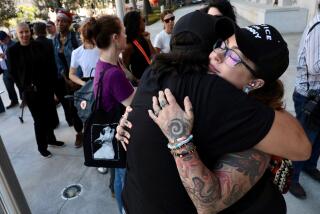Items From Kraft Home Brought to Court
- Share via
The first week of testimony in the Randy Steven Kraft murder trial ended Thursday with a parade of evidence from Kraft’s Long Beach home and observations by both the judge and a prosecutor that the trial was moving forward at a much faster pace than had been anticipated.
Investigators and criminalists marched into court Thursday with sack after sack of evidence taken from Kraft’s home following his arrest on May 14, 1983.
The evidence included items such as a double-head electric Norelco shaver, a thick, hardback guide to prescription drugs, numerous pill vials, color pictures of young men, a shag carpet and several men’s belts and shoelaces. All the items, taken from Kraft’s house and his garage, are considered by prosecutors critical evidence in several murders of young men.
Kraft, now 43, was arrested when two California Highway Patrol officers found a dead Marine in the front passenger seat of his car. Kraft is charged with 16 Orange County murders in what is expected to be the most expensive and one of the longest trials in the county’s history.
Kraft attorneys have said the trial could take up to a year and a half. Superior Court Judge Donald A. McCartin had warned the jurors during the selection process in his Santa Ana courtroom that the trial might take at least a year.
But indications so far are that the trial could be much shorter than that.
McCartin noted for jurors at the end of testimony Thursday that the Kraft trial has been moving much more quickly than the Richard Ramirez serial murder trial in Los Angeles. Ramirez is charged with 14 murders.
Both trials began July 21, but the Ramirez trial is still in an early stage of jury selection, the judge said.
“We’re moving reasonably forward even though you might not think we are,” McCartin said.
Deputy Dist. Atty. Bryan F. Brown told the court that the trial may be moving even more quickly than the judge anticipated. Brown estimated that he will be finished putting on his case in 6 1/2 more weeks. So far, Brown has put on 23 witnesses and has introduced 236 items for identification, though not all of those are yet in evidence.
Kraft attorney C. Thomas McDonald said that he was surprised by prosecutor Brown’s estimate and that it is still unclear to him how long the trial will last.
The defense has not said how long its presentation will be. But when both sides have completed their case, the length of the trial is then up to the jury. If Kraft is convicted of at least two murders, or just one murder along with one of the special circumstances of sodomy involved, the trial would move into a penalty phase.
At that time, jurors would decide whether to return a death verdict or life without parole. Prosecutors say they will introduce up to 29 murders in the penalty phase in an attempt to win a death verdict against Kraft.
One piece of evidence the jury will not see is color photographs of the area below the car seat where the Marine was found.
Because the Marine, Terry Lee Gambrel, had not been bleeding, blood stains below the seat suggested to investigators that Kraft might be linked to other murders. But the judge Thursday upheld defense attorney McDonald’s objection to that evidence.
The defense contends that the pictures are “inflammatory” because prosecutors cannot prove that the blood belongs to any of the 16 victims named in the charges against Kraft.
Yet other evidence--material that helps prosecutors shore up their theories--has been presented to jurors.
The prosecution contends that Kraft was able to kill his victims by overpowering them with drugs and alcohol and then kept mementos from some of them.
The electric shaver, for example, has been identified as belonging to Eric Church, 21, found dead in Seal Beach on Jan. 27, 1983. Jurors will later hear testimony by the victim’s father that the razor still shows re-wiring work he had once done to repair it.
Prosecutors also claim that Kraft was knowledgeable about which drugs would put his victims in a drunken stupor, and they say that explains the guide to prescription drugs.
More to Read
Sign up for Essential California
The most important California stories and recommendations in your inbox every morning.
You may occasionally receive promotional content from the Los Angeles Times.













